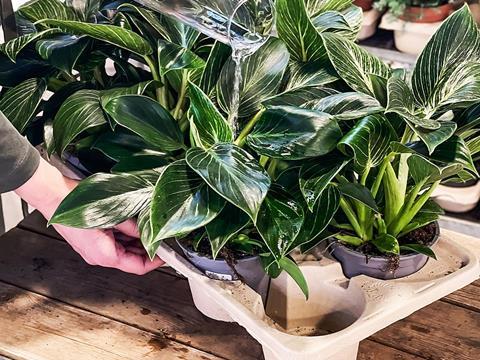
ICA Sweden is implementing Stora Enso’s moulded wood fibre trays for flowers in place of traditional polystyrene alternatives, claiming that the transition reduces CO2 emissions by up to 81%.
Manufactured in Sweden, the trays are said to constitute sustainably sourced Nordic wood fibre and are reportedly produced using 100% green electricity. As they are made from pressed wood fibre, Stora Enso claims that the trays are free of plastic and PFAS.
ICA hopes that the transition will help cut down on its plastic use and encourage responsible consumption.
“We are proud to be the first grocery retailer in Sweden to take a big step towards a more sustainable flower nutrition together with our talented growers and suppliers,” says Sandra Kjellin, shop floor manager Flowers, ICA Sweden. “The transition to wood fiber trays will be gradual and the first step will be several of our fine potted plants, followed by an ongoing conversion of our summer flowers.”
“We are thrilled to announce our partnership with ICA Sweden, leading the way in sustainability with our fiber-based flower trays,” adds George Ribaeus Beri, senior business development manager at Stora Enso. “Each purchase not only blossoms with beauty but also nurtures our planet.
”Together, we’re redefining eco-conscious solutions, one tray at a time.”
The company says that it uses all fractions of a tree to produce biobased solutions and strives to replace fossil-based and non-renewable materials with low-carbon, recyclable, fibre-based alternatives – thus meeting growing demand for renewable, sustainability-minded products.
Last year, Stora Enso worked alongside Mester Grønn to package plants in a formed fibre transportation tray; the transition away from plastic was set to lower CO2 emissions and help lower the environmental impact of the flower industry.
A new AIMPLAS project is also converting plant waste into packaging and adhesives using solvent-free mechanochemical techniques, aiming to prevent harmful substances out of landfill and the natural environment.
Our editor at large, Elisabeth Skoda, spoke to Hartmann Group’s Kati Ørskov about its Greenpack MAP fibre-based tray for meat products – and, on a wider scale, the potential of moulded fibre packaging.
If you liked this story, you might also enjoy:
Report: The ultimate guide to global plastic sustainability regulation
The Brief: Oxo-(bio)degradables: the who, what, and why of breaking down fossil-based plastics
Sustainable Packaging Summit: How Kraft-Heinz uses collaboration to drive innovation
The Brief: Using ocean-bound plastic in packaging – how, why and should we?


















No comments yet